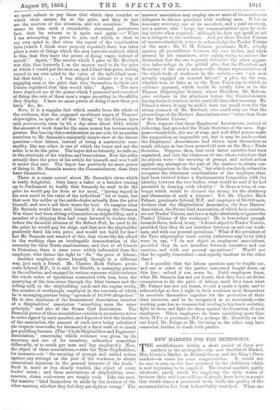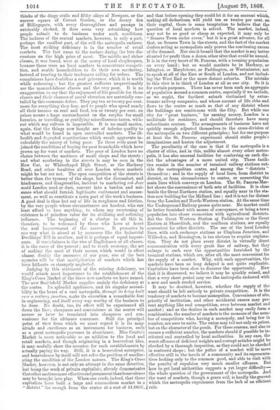NEW MARKETS FOR THE METROPOLIS.
THE establishment within a short period of three new markets in the metropolis—the new Smithfield Market, Miss Coutts's Market in Bethnal Green, and the King's Cross market—is cause for some congratulation. It would not be easy to sum up the loss sustained by the deficiency which is now beginning to be supplied. The central markets, partly wholesale, partly retail, for supplying the daily wants of between three and four millions of people, have been on a scale that would shame a provincial town, while the quality of the accommodation has been indescribably wretched. When one thinks of the dingy stalls and filthy alleys of Newgate, or the narrow square of Covent Garden, or the dreary den of Billingsgate, with every thoroughfare and passage in extricably choked, it does seem very astonishing how people submit to do business under such conditions. The badness of the central markets, however, is only a part, perhaps the smallest part, of the evil the metropolis endures. The most striking deficiency is in the number of retail markets. The fact came to the surface during the late dis- cussions on the high price of meat. The middle and richer classes, it was found, were at the mercy of local shopkeepers, because there were no local markets to concentrate competi- tion, and enable householders to do their own marketing, instead of trusting to their tradesmen calling for orders. The complainers have doubtless a real grievance, which it is worth while redressing ; but the greatest sufferers unquestionably are the manual-labour classes and the very poor. It is no exaggeration to say that the enjoyment of life possible for these classes and their chances of moral elevation are materially cur- tailed by this economic defect. They pay ten or twenty per cent. more for everything they buy, and to people who spend nearly all their income on rent and food, ten or twenty per cent, on prices means a huge encroachment on the surplus for small luxuries, or travelling, or gratifying miscellaneous tastes, with- out which any culture is impossible. It is no small matter, again, that the things now bought are of inferior quality to what would be found in open controlled markets. The ill- health and degraded constitutions which result aggravate in- calculably the misery of being poor. To these evils must be joined the conditions of buying for poor households which have grown up for want of markets. The poor of London have no choice between the nastiness of small shops and the streets ; and what marketing in the streets is may be seen in the New Cut, or Whitechapel High Street, or the Hackney Road, and other localities all over London where markets might be but are not. The open competition of the streets is better than the tyranny of the shops, but the discomfort, and hindrances, and disagreeables, incident to marketing sub Jove amid London mud or dust, convert into a burden and nui- sance what should furnish legitimate excitement and amuse- ment, as well as constitute a main part of the week's business. A good deal is thus lost out of life in roughness and friction, by the very people whose circumstances are hardest, who can least afford to lose anything, to whom any sweetening of existence is of priceless value for its civilizing and softening
influence. The beginning of a change to all this is, therefore, to be welcomed by those who have at heart the real improvement of the masses. It promotes in one way what is aimed at by measures like the Industrial Dwellings' Bill in another, and it is perhaps of equal import- ance. If wastefulness is the vice of Englishmen of all classes, it is the curse of the poorest ; and to teach economy, the art of making the most of their means, which would in effect almost double the resources of our poor, one of the best agencies will be that multiplication of markets which has been hitherto so strangely neglected.
Judging by this statement of the existing deficiency, we would attach most importance to the establishment of the King's Cross Market of the three new markets we have named. The new Smithfield Market supplies mainly the deficiency at the centre. Its splendid appliances, and its singular accessi- bility in the heart of a vast metropolis, through its being built over a railway junction, make its execution a remarkable feat in engineering, and itself evety way worthy of the business to be done. No doubt, too, its effect will be experienced all down the line ; cheapness and convenience at the centre will sooner or later be translated into cheapness and con-
venience for the ultimate consumer. Still the principal point of view from -which we must regard it is its mag- nitude and excellence as an instrument for business, such as a great metropolis possesses in abundance. Miss Coutts's Market is more noticeable as an addition to the local and retail markets, and though originating in a benevolent idea, it may usefully show the occasion for such establishments by actually paying its way. Still, it is a benevolent enterprise, and benevolence by itself will not solve the problem of amelior- ating the condition of the London masses. The King's Cross Market, however, is not only an attempt in the same direction, but being the work of private capitalists, already demonstrates that other motives more effective and permanent than benevolence may be brought into play. When one reads, indeed, that three capitalists have built a large and commodious market in a " district " far enough from the centre at a cost of 41,0001.,
and that before opening they could let it for an amount which, Imaking all deductions, will yield ten or twelve per cent. on I their capital, there is some temptation to believe that the question of local markets is solved. The market, indeed, may not be so good or cheap as expected, it may only be "Somers Town under cover," but it is a great advance, for all that, on Somers Town in the streets, and the fact of the market dealers acting as monopolists only proves the continuing excess of the demand. Nor can it be said that the market is any better situated for profit than a dozen other sites that could be named. It is in the very heart of St. Pancras, with a teeming population on every hand ; but so would markets be in Hackney, or Islington, or Marylebone, or Paddington, or Westminster, not to speak at all of the East or South of London, and not includ- ing the West End or the more distant suburbs. The mistake in this view is to think of London at all as one city. So it is for certain purposes. There has never been such an aggregate of population around a common centre, especially if we include, as we ought, the furthest suburb victimized by extor- tionate railway companies, and whose current of life ebbs and flows to the centre as much as that of any district where the buildings are continuous with the City. But while one city for "great business," for earning money, London is a multitude for residence, and should therefore have many subordinate centres. The arrangements of business have not quickly enough adjusted themselves.to the cross-division of the metropolis on two different principles ; but for one purpose at least the St. Pancras experiment should strike people's imaginations and hasten the adjustment. The peculiarity of the case is that if the metropolis is a cluster of cities, and in this, unlike almost every other metro- polis, it has also unusual facilities for conferring on each dis- riot the advantages of a more united city. These facili- ties consist in the number of terminal railway stations out- side the metropolitan centre, and among the " districts " themselves ; and in the supply of local lines, from district to district, or from circumference to centre, or connecting the main lines which converge on London. The St. Pancras Mar- ket shows the convenience of both sets of facilities. It is close beside the Great Northern station, and equally near to the sta- tion now building for the Midland line ; and it is not far distant from the London and North-Western station. At the same time the Underground Railway passes quite near. No market could be better furnished with means of conveyance, or bring a town population into closer connection with agricultural districts. But the Great Western Station at Paddington or the Great Eastern at Shoreditch, and the southern stations, are equally convenient for other districts. The use of the local London lines, with such exchange stations as Clapham Junction, and Willesden, and Kensington, is too obvious to require explana- tion. They do not place every district in virtually direct communication with every great line of railway, but they enlarge in each case the opportunities furnished by the terminal stations, which are, after all, the most convenient for the supply of a market. Why, with such opportunities, the markets have been so long delayed is not quite explicable. Capitalists have been slow to discover the opportunity. Now that it is discovered, we believe it may be quickly seized, and that a very short period may see the metropolis endowed with a new and much needed service.
It may be doubted, however, whether the supply of the want should be left entirely to private competition. It is the tendency of markets to become monopolies. Convenience of site, priority of institution, and other accidental causes may pre- vent anything like real competition, even between market and market ; and as the dealers in each market may easily form a combination, the number of markets is the measure of the num- ber of competitors who, having a monopoly, and being few in number, are sure to unite. The union may tell not only on prices, but on the character of the goods. For these reasons, and also to ensure a sufficient number, the markets should if possible be in- stituted and controlled by local authorities. In any case, the worst offences of deficient weights and corrupt articles might be checked by a thorough inspection, as they could not be checked in scattered shops ; but the police of a market will be more effective still in the hands of a community and its representa- tives looking only to the common good, and able to visit with the penalty of expulsion very much smaller offences. But how to get local authorities suggests a yet larger difficulty— the whole question of the government of the metropolis. And the want of markets, though a grave evil, is hardly the gravest which the metropolis experiences from the lack of an efficient rule.































 Previous page
Previous page